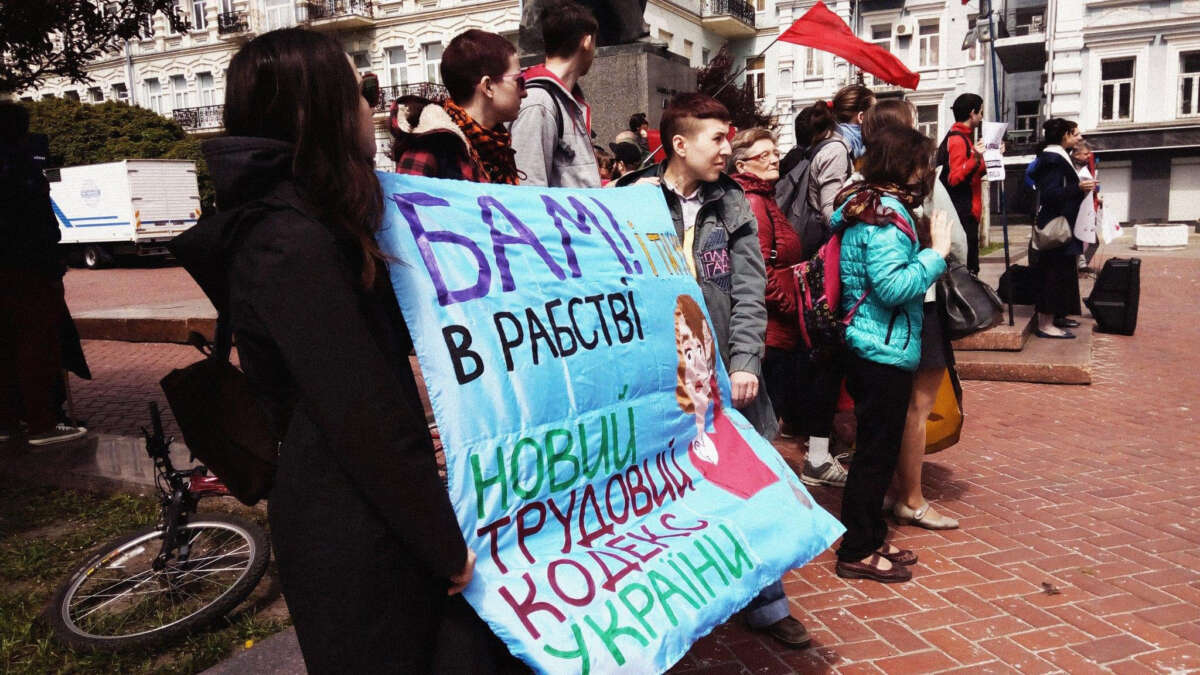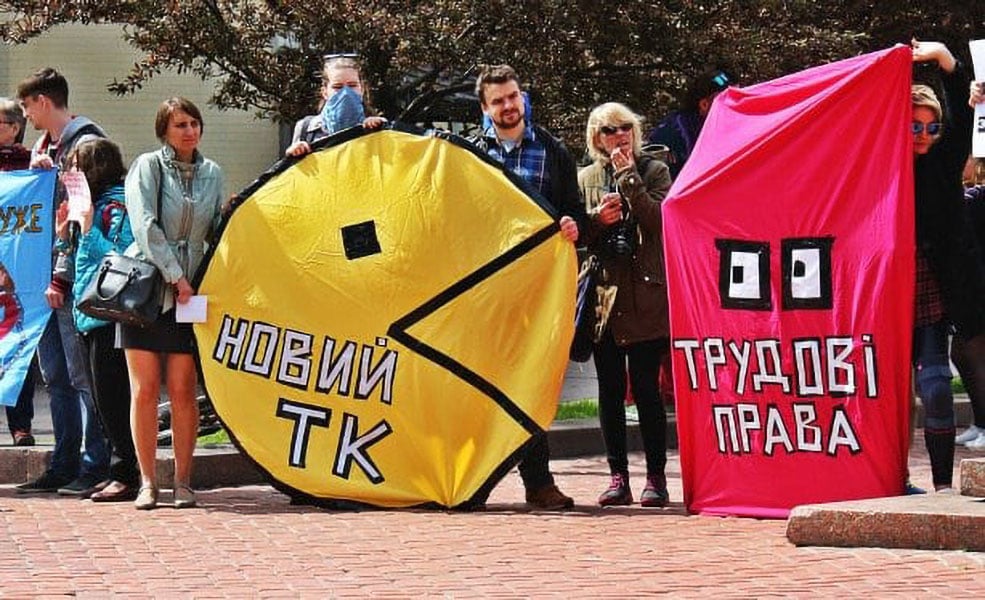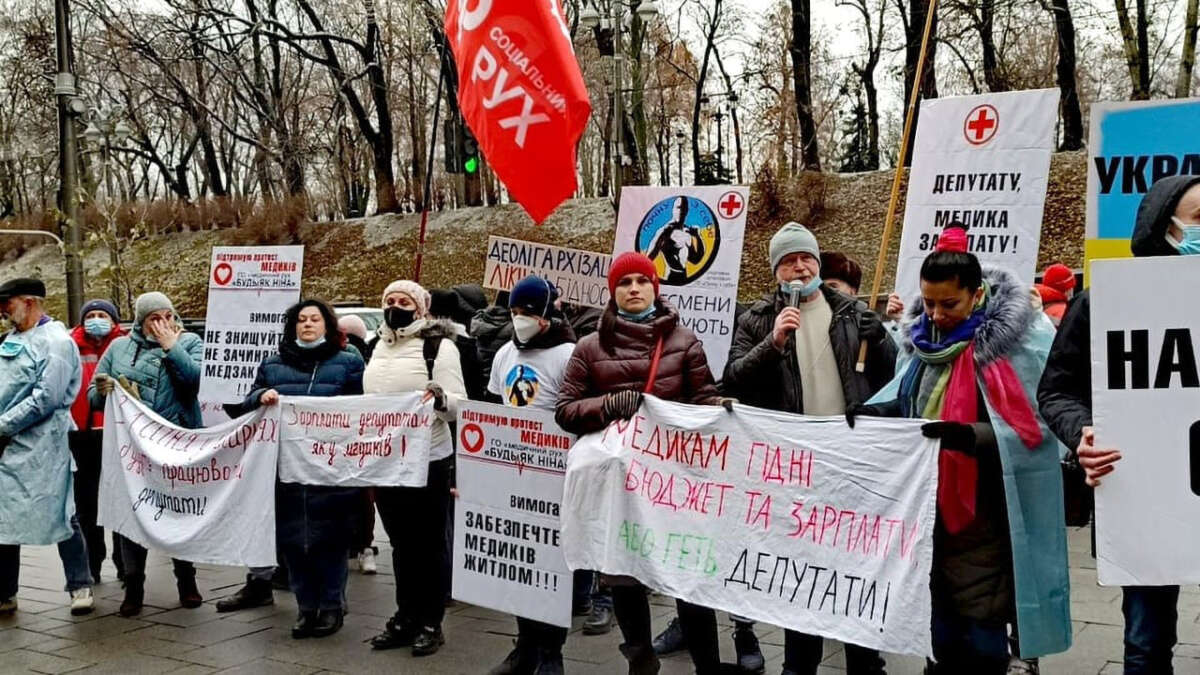3 Years Into War, Ukrainian Leftists Fight for Labor Rights Under Martial Law
As Russia’s invasion of Ukraine enters its third year, Ukraine’s left-wing community is continuing its work fighting both neoliberalism and Russian aggression.
Sotsialnyi Rukh or “Social Movement” is Ukraine’s largest and oldest democratic socialist organization. Founded in the aftermath of the Euromaidan protests of 2013-14, Sotsialnyi Rukh has held steadfast to its principled leftist politics in the wake of Russia’s invasion. Euromaidan was as foundational to Sotsialnyi Rukh as it was to the ongoing war. Euromaidan was the result of then-President Viktor Yanukovych’s decision to soften ties with Moscow and reject the European Union–Ukraine Association Agreement, functionally charting Ukraine on a path away from the European Union and toward Russia and war in the eastern regions. Since President Volodymyr Zelenskyy imposed martial law after the start of Russia’s full-scale invasion in February 2022, left-wing activism in Ukraine has come to a functional standstill, as protests are largely forbidden and Zelenskyy’s Servant of the People party embraces neoliberal and anti-union policies.
Vitaliy Dudin, 37, leader of Sotsialnyi Rukh, has been active with the organization since its inception. Dudin joined Truthout for an interview in downtown Kyiv, two days after a Russian attack on the outskirts of the city killed 12 and injured at least 90. Sotsialnyi Rukh is closely associated with Ukraine’s various trade unions, including Confederation of Free Trade Unions of Ukraine and Federation of Trade Unions of Ukraine, and Dudin considers himself first and foremost a trade unionist.
Dudin shared that before the interview he was at a court proceeding where he is representing a client pro bono in a labor dispute. “I expected that we will [sic] have a court ruling today. But an air alarm was announced and the proceeding was adjourned. The next hearing will be on May 26. A lot of labor disputes are being resolved without calling up the parties to this proceeding. Why? ‘Cause it’s more effective.” Dudin emphasized that since the start of the war, there has been a significant escalation in anti-labor rhetoric and policies by the Ukrainian government. He was lucky to have a hearing, he emphasized, even though it was postponed due to the missile attack.
Visibly exhausted from his day at court, Dudin explained that this is the reality of leftist activism in Ukraine, post-Russian invasion. “Class struggle in Ukraine now, it’s so boring. It’s boring. Because it’s not about protest, it’s judicial and other official procedures.” Since February 24, 2022, Ukraine has been in a state of martial law which has permitted authorities to limit public gatherings and impose a standing curfew, among other restrictions. In many cases, these regulations have been weaponized against left-wing activists fighting for labor rights.

A law that passed parliament in March 2022 further cemented this erosion of labor rights. Among other changes, the law allows employers to fire employees who are on sick leave or vacation, expands working hours to 60 hours a week and requires employees to do work outside the terms of their contract if it is for defense purposes. All of this was justified by Russia’s invasion and the defense of the country. However, such alterations to longstanding labor policy have tipped the scale drastically in favor of employers, and there is to time limit to the law, so as Dudin emphasized, these alterations are meant to stay in effect even after the war. Ana Babić, 27, who is a student activist and member of a student trade union in Kyiv, told Truthout, “We have a problem now that the military can do basically anything. They can total a car, and there will be no consequences because they are the military. And what can you do?”
In the last week of April, Sotsialnyi Rukh hosted a conference on workplace injuries during the war. Since the start of Russia’s full-scale invasion, 2,747 workers have been injured and 677 killed while performing work-related duties according to the State Labour Service. “And a lot of them haven’t received the compensation from the state that was promised [in the collective bargaining agreement],” Dudin told Truthout. An MP of Zelenskyy’s Servant of the People party, Pavlo Frolov, was in attendance and said that his party can and should do more to support the rights of Ukrainian workers. The conference featured a wide array of attendees, from railway and other transportation workers who had been injured since Russia’s invasion to teenage activists espousing pro-labor politics. “To win a court proceeding together with the independent trade union of railway workers against the biggest railway company is possible. We did it. So in Ukraine, it’s still possible to challenge people who have money, who have power, and so on,” Dudin said during his speech at the conference.
“In Ukraine, it’s still possible to challenge people who have money, who have power.”
While active since 2015, Sotsialnyi Rukh came to a newfound prominence in the first months of the war due to its support for LGBTQ+ rights, socialist politics and the right of the Ukrainian people to engage in armed struggle against the Russian invasion. Dudin said that the extent of the U.S.’s involvement in the war can and should be discussed, as well as the government’s neoliberal policies, but as long as Ukraine is an independent state, Ukraine has a right to defend itself in a war that has claimed the lives of at least 12,000 civilians (and perhaps as many as 70,000 Ukrainian soldiers and 260,000 Russian soldiers.) Some of the international left has repeated Putin’s line that Ukraine is rife with Nazi ideology — a pretext which was used by Russia to justify the invasion to “denazify Ukraine.” Babić says that right-wing populism and far right ideology is on the rise, but added, “We are at war. And in any war in any region, you will have a rise of right-wing extremism.” Sotsialnyi Rukh’s commitment to a left-wing politic that is inclusive of all gender identities and sexualities strives to be an antidote to this rise in reactionary politics. Only by offering Ukrainians a logical alternative to the nationalistic and xenophobic right-wing political parties can Sotsialnyi Rukh counter this shift, according to Babić.

“We unite about 100 people in different cities of Ukraine, and we are the only openly left-wing organization which promotes ideas of democratic socialism, of anti-fascism, of gender and social equality. And 10 people, maybe more than 10 people are now in the armed forces of Ukraine,” Dudin said.
Dudin emphasized that first and foremost Sotsialnyi Rukh is concerned with humanitarian efforts, including supporting soldiers on the front lines. Sotsialnyi Rukh not only allies with trade unions and provides pro bono support to workers in labor disputes, it also provides material assistance for soldiers fighting to maintain Ukraine’s territorial integrity. It also supports the efforts of other left-wing organizations in Ukraine, such as Solidarity Collectives, which frequently post fundraising drives for flak jackets and medical kits for soldiers.
But every aspect of their work has grown more difficult as the war has entered its third year. “Now, organizing a protest is much more emotionally taxing. Why? Because you should prove that you have a right to go on the street because we have martial law and protests are banned, they’re prohibited. If you have a clear clash against central authorities, you should be prepared that this public rally can be stopped by the police,” Dudin stated matter-of-factly. During a Sotsialnyi Rukh demonstration at the Ministry of Health, demanding better compensation and protections for health care employees, the police blocked them from entering the facility and attempted to break up the demonstration.

On the ground in Kyiv it is obvious that there is fatigue from the war, and with ceasefire negotiations between Kyiv and Moscow continuing with no end in sight, Sotsialnyi Rukh’s activists are digging in for the long haul. “I refuse to give any thought on when the war will end. I prefer to live as [if] the war always was and always will be. That way I can focus on humanitarian efforts,” Babić said.